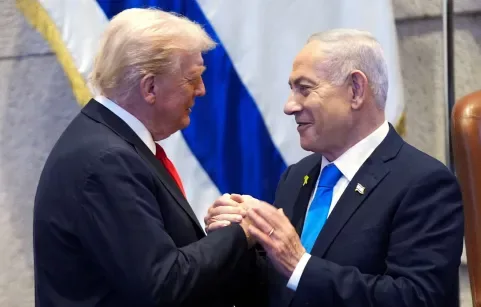The recent return of hostages has emerged as a significant political event, highlighting the complex interplay between U.S. politics and international relations, particularly concerning Israel. This development is not only a pivotal moment for the families of those held captive but also a notable achievement for both former President Donald Trump and the Israeli government.
In the context of U.S.-Israel relations, Trump’s administration maintained a strong pro-Israel stance, often emphasizing the importance of supporting Israel’s right to defend itself. His refusal to impose restrictions on Israel’s military actions has been viewed as a commitment to the nation’s sovereignty and security. This approach has resonated with many supporters who believe that a robust U.S.-Israel alliance is crucial for stability in the Middle East.
The return of hostages can be seen as a triumph not just for the families involved but also for the diplomatic efforts that have been made behind the scenes. The negotiations leading to this outcome often involve delicate balancing acts, where political leaders must navigate the demands of various stakeholders, including military strategists, diplomats, and the families of hostages.
For Trump, the successful return of hostages serves as a reaffirmation of his foreign policy strategy. His administration’s focus on strengthening ties with Israel has been a cornerstone of his political identity, and this event could be leveraged to bolster his image as a leader capable of achieving significant results on the international stage. Supporters may view this as evidence of his effective leadership, while critics might argue that it oversimplifies the complexities of international diplomacy.
In Israel, the return of hostages is celebrated as a victory that underscores the nation’s resilience and determination to protect its citizens. The Israeli government has been vocal in its commitment to securing the release of individuals taken captive, often positioning itself as a defender of human rights. This narrative aligns with the broader Israeli ethos of prioritizing the safety and well-being of its citizens, reinforcing national unity in times of crisis.
Moreover, the return of hostages has implications for the political landscape in both the U.S. and Israel. In the United States, it may influence public opinion as the nation approaches the next election cycle. Voters often evaluate candidates based on their foreign policy successes, and Trump may use this moment to rally support among his base, framing it as a testament to his leadership and diplomatic skills.
In Israel, the successful resolution of hostage situations can bolster the current government’s standing. Leaders who are perceived as effective in securing the safety of their citizens often gain favor among the electorate, which could impact upcoming elections. The political ramifications of such events are significant, as they can shift public sentiment and alter the dynamics of power within the government.
As the situation continues to evolve, it is essential for both American and Israeli leaders to navigate the aftermath of this event with care. The complexities of international relations require a nuanced approach, and the return of hostages is just one facet of a broader geopolitical landscape. Moving forward, both nations will need to address the underlying issues that contribute to such crises, including regional tensions and the ongoing challenges of peace negotiations.
In conclusion, the return of hostages marks a significant moment for both President Trump and Israel, highlighting the intricate relationship between U.S. politics and international diplomacy. As this narrative unfolds, it will be crucial for leaders to remain focused on fostering peace and security in the region while also considering the political implications of their actions at home. The interplay between domestic and foreign policy will continue to shape the political discourse in the United States, and the success of diplomatic efforts will be closely scrutinized by voters and leaders alike.
